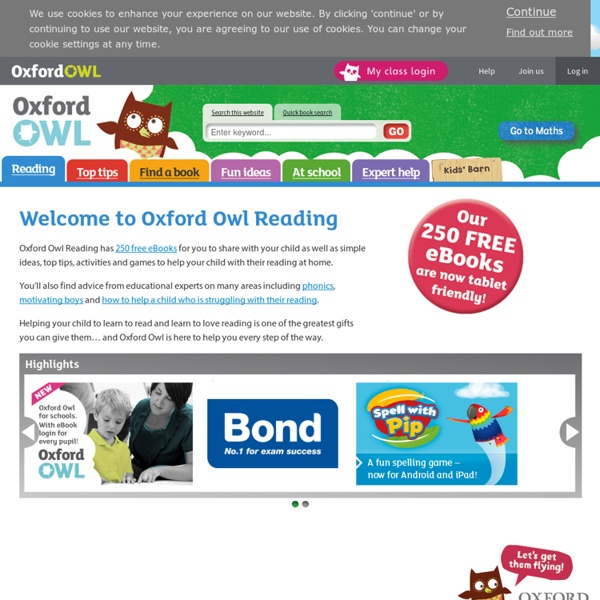



Oxford Reading Tree Read with Biff, Chip, and Kipper: Level 1 Phonics & First Stories: Six in a Bed and Other Stories by Roderick Hunt, Kate Ruttle, Annemarie Young, Buy Recommended Books and Read Reviews – Lovereading4kids UK Oxford Reading Tree Read with Biff, Chip, and Kipper: Level 1 Phonics & First Stories: Six in a Bed and Other Stories by Roderick Hunt, Kate Ruttle, Annemarie Young Read With Biff, Chip and Kipper is the UK's best-selling home reading series. It is based on Oxford Reading Tree which is used in 80% of primary schools. This Read with Biff, Chip & Kipper Level 1 Collection is great value, containing 4 books in 1! It includes Biff's Wonder Words, Floppy's Fun Phonics, and the stories Six in a Bed, Get Dad! Praise for The Moon Jet and Other Stories: The additional games and activities provided in the book make it a fun way to learn, inclusive for parents and children, as well as being a collection of enjoyable short stories.
Find a book There are so many wonderful books, but how do you know which ones to choose? Browse through our library of 250 FREE eBooks to find an engaging book for your child. All our eBooks are tablet friendly, simply register and enjoy a world of reading and fun activities. Whether you’re looking for a book to share with your youngest child or something to keep your ten year old motivated, we’re here to help. If you’re not sure which books to start with, take a look at the different series below... Learning to Read at Home Read with Biff, Chip and Kipper The UK’s favourite home reading series. Read with Biff, Chip and Kipper has been created by educational experts to help you support your child’s development as a reader and complement what they are doing at school. Phonics books provide valuable practice for your child, especially as they prepare for the new reading test for six year olds being introduced by the Government. Why is Read with Biff, Chip and Kipper so popular? Read Write Inc. ProjectX
At school Your child’s reading experience is much more than the reading book which comes home from school. Reading is happening all the time in a classroom and in school. It is taught in specific reading and English lessons, but children are practising and using their ‘reading’ constantly across all subjects too. A child’s ‘reading journey’ begins with ‘learning to read’ and moves on into ‘reading to learn’. This advice will help you to make sense of the latest curriculum and testing changes and understand how reading is taught and developed. Statutory requirements for teaching reading All schools have to follow an agreed curriculum in the teaching of reading (and other subjects). England: The National Curriculum 2014.Wales: A National Literacy and Numeracy Framework (5-14 year olds). Assessing progress Different ways to teach and practise reading Take a look below for general top tips for younger readers 3-7 years or 7-11 years, or select from the panel for age specific ideas for 3-11 year olds.
Up you Go and Other Stories (Read With Biff, Chip and Kipper Level1) (Read With Biff Chip & Kipper) eBook: Roderick Hunt, Alex Brychta: Amazon.co.uk: Kindle Store This shopping feature will continue to load items. In order to navigate out of this carousel please use your heading shortcut key to navigate to the next or previous heading. ICT to support early years learning Published on November 7th, 2013 | by Mark Anderson Looking for ICT to support early years learning? Here are some of the best rated tools out there and some free resources for teachers. Teach Your Monster To Read Award winning website that helps young people practice their first steps in reading Beluga Learning / Maths Brilliant site for engaging young learners with numeracy. Poisson Rouge A lovely set of online games and activities for young children to practise their computer, problem solving and thinking skills. Oxford Owl A website resource with free resources and ebooks to help young learners with reading and maths. Phonics Play A website with lots of different interactive resources to help young learners with their phonics. Early Learning HQ Gooru Fungooms
E-Books - Romona Library Media Center An online literacy resource that pairs fiction video stories with non-fiction eBooks to help students build a love of reading. (Proudly Sponsored by the Romona Elementary School PTA!) 15 eBooks students can check out from Romona Library Media Center and read online or through the FolletShelf app (app available for iPod, iPad, or Android devices) Many of the books are 4th grade Reading Rally books. --User Name: last name + first name (ex: smithmary)--Password: Lunch IDFollettShelf URL: wbb09849 The International Children's Digital Library's collection includes 4,600+ books in over 60 languages. We Give Books is a digital initiative that enables anyone with access to the Internet to put books in the hands of children who don't have them, simply by reading online. 250 eBooks are available for students to read online. A collection of animated, talking picture books that help teach children the joys of reading.